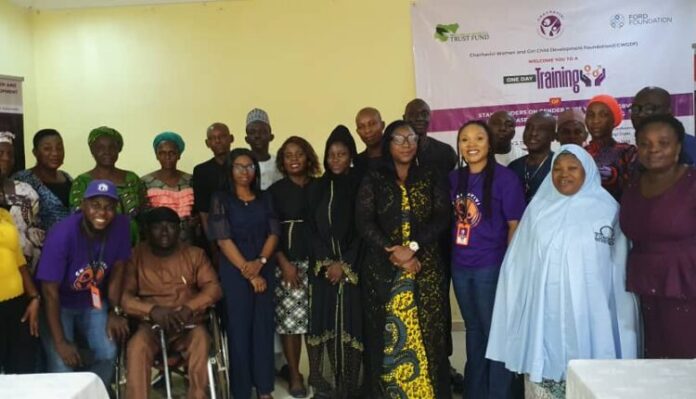By Yekini Jimoh Lokoja,
Gender Base Violence (GBV) remains a challenge that significantly constrains women’s autonomy and opportunities in Nigeria according to gender expert, Bola Abimbola
Abimbola, Senior Program Manager and Head Program, Communication and Advocacy Savannah Centre for Diplomacy, Democracy and Development Abuja, disclosed this on Saturday at a one-day training of stakeholders on gender base violence basics, case management and reporting organized by Chachavivi Women and Girl Child Development Foundation With funding from Nigeria Women trust fund
Abimbola, while making reference to United Nations Refugee Agency (UNHCR), said Gender-Based Violence refers to harmful acts directed at an individual based on their gender, adding that, It is also regarded as violence directed against a person because of that person’s gender or violence that affects persons of a particular gender disproportionately.
The gender expert who was represented by Friday Ogezi noted that People with Disabilities also face Gender Base Violence stressing that, GBV is widely known to be a serious violation of human rights and a life-threatening health and protection issue.
Explaining further, he opined that, “GBV is a global public health problem occurring within the home (domestic) or in the wider community and it affects both genders. But it is the most prevalent human rights violation in women worldwide”.
“The Council of Europe Istanbul Convention mentioned psychological violence, stalking, physical violence, forced marriages, sexual harassment, aiding or abetting and attempting, and unacceptable justifications for crimes committed in the name of so-called honour (Africa and Asia as an example) as types of gender-based violence”.
He identified Physical Violence, Psychological Violence, Verbal Violence, Gender Hate Speech, Sexual Violence, Socio-Economical Violence, Domestic Violence or Violence in Intimate Relationships as some of the types of GBV.
Stressing on effective referral and pathway, the resource person said it is a mechanism that enables a patient’s health needs to be comprehensively managed using resources beyond those available at the location they access care from, be it in a community unit, dispensary, health centre or a higher level health facility.
“GBV referral pathways are flexible mechanisms that safely link survivors to services such as health, psychosocial support, case management, safety/security, and justice and legal aid.
“In strengthening referral pathways to ensure coordination; established ethical and safe referral pathways, make rational and efficient use of local resources by avoiding duplication of efforts and harmonizing services, develop allies and minimize discord, promote transparency among providers, improve monitoring of multi-sectorial responses, provide effective referrals training guide and most importantly identify referral needs (i.e. speak directly to the referral provider (as appropriate), provide a verbal or written handoff (with the person’s consent), manage difficult situations and follow up with the client about the referral).
“The Gender-Based Violence Information Management System (GBVIMS) is a tried-and-tested approach for the collection, management and sharing of GBV-related data generated through service delivery. The GBVIMS initiative was originally launched in 2006 by UNOCHA, UNHCR, and the IRC. However, the GBVIMS Steering Committee now consists of UNFPA, UNICEF, UNHCR, IRC and IMC; sequel to this a robust GBV information management system has been implemented in over 20 countries for nearly 10 years.
“The Gender-Based Violence Information Management System enables those providing services to GBV survivors to effectively and safely collect, store, analyze and share data related to the reported incidents of GBV. The GBV information management is carried out in order to facilitate the compilation and sharing of sensitive information between humanitarian actors in a safe manner”.
He maintained that the survivor-centred approach is also considered a proven method for effective GBV reporting and referral stressing that they include respect, safety, confidentiality and non-discrimination.
Earlier, the Project Officer of Chachavivi Women and Girl Child Development Foundation Solomon Umar said the organization is committed to increasing and improving access to services for the well-being of Women and girl children, marginalized and less privileged through partnership and accountability, resource mobilisation, quality service delivery, accountability, inclusive programming and capacity development for relevant stakeholders.


